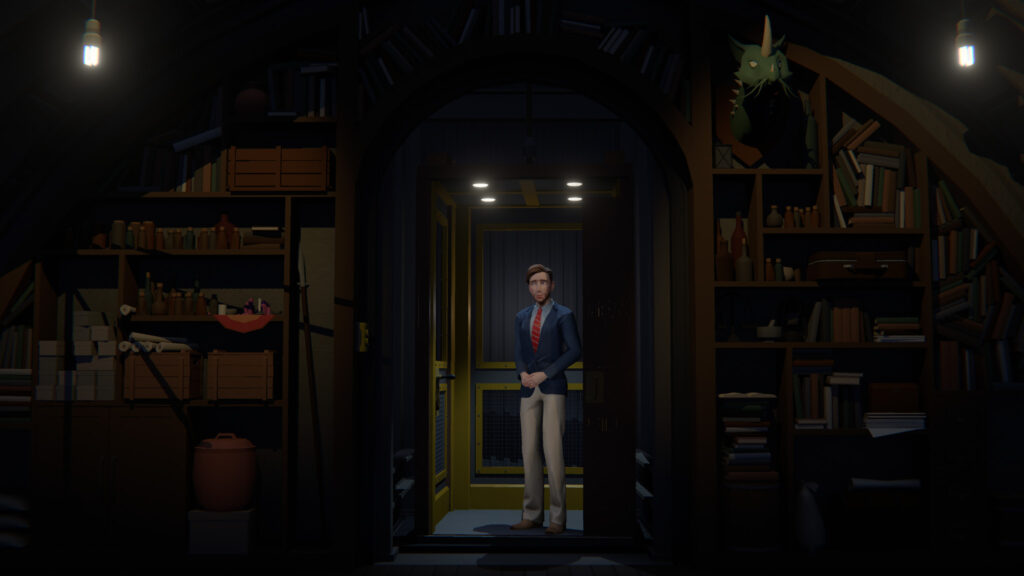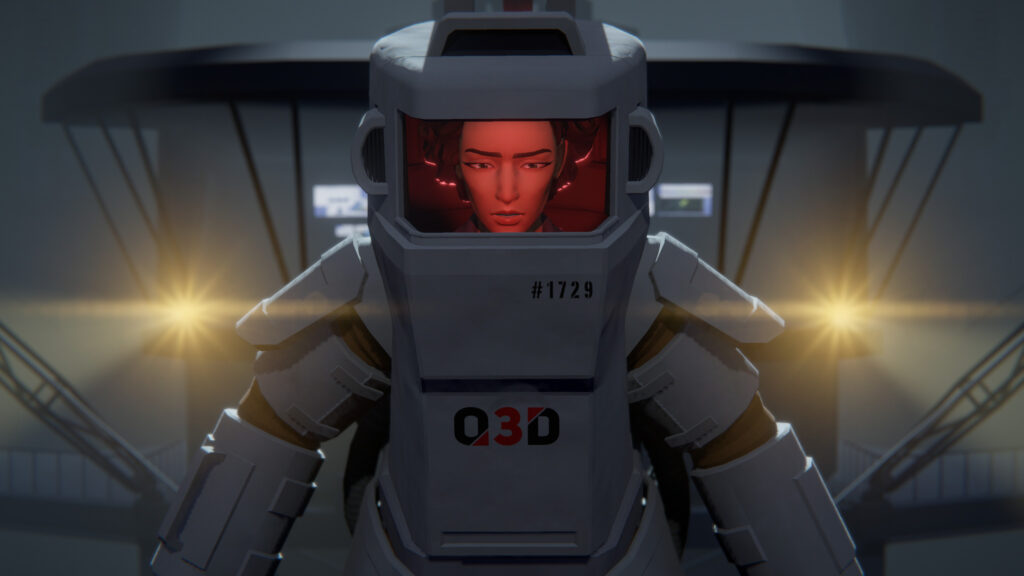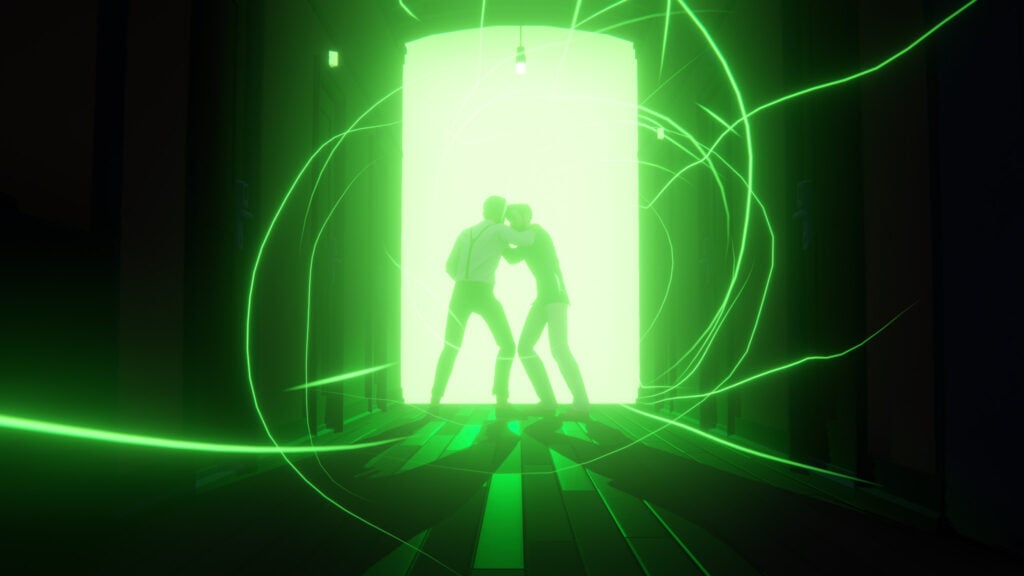Features
Finding Magic In The Mundane: An Interview With Last Stop Co-Directors Jonathan Burroughs, Terry Kenny, And Lyndon Holland
We interview the creators of Last Stop to learn about their creative process, inspirations, the importance of comedy in game storytelling, and much more.

Last Stop Developer Interview
In 2016, indie studio Variable State burst onto the gaming scene with their cult-hit Virginia. A narrative focused adventure game with no dialogue, Virginia pushed the boundaries of game storytelling and won numerous awards in the process – receiving the BAFTA award for best music and ending up on TIME’s top 15 games of the year. Now, five years later, Variable State is ready to launch their next game: Last Stop.
Like Virginia before it, Last Stop is an adventure game with a heavy emphasis on narrative. However, unlike its opaque predecessor, Last Stop is all about dialogue and character interaction – focusing on intimate relationships in the context of an outlandish sci-fi story. The game follows three characters: Donna, a high school girl who, along with her friends, stumbles upon a strange mystery, Meena, a shady government agent, and John, a single dad who becomes the hapless victim of supernatural shenanigans. At a glance, the characters couldn’t be further apart, living completely separate lives in different strata of society, but ultimately, their lives parallel one another as each character struggles with their daily life and has their routine existence uprooted by supernatural phenomena.
Last Stop, originally announced back in 2019 during an Xbox Games Showcase, has been an enigma for the past few years with only brief trailers to whet players’ appetites. But now, following a gameplay demo and a new trailer unveiled during Nintendo’s Indie World Showcase, Variable State is ready to dive deep into its creation ahead of the game’s launch in July. So, to take advantage of this enthusiasm, we reached out to the Last Stop’s co-directors – Jonathan Burroughs, Terry Kenny, and Lyndon Holland – for an expansive interview.

Goomba Stomp: Last Stop’s title is quite interesting, seemingly referencing a train station or bus stop. What do you wish to convey with it and how did you come to choose it over your original title, Moon Lake?
Jonathan Burroughs: The final title actually came from Annapurna! They’ve been very involved in shaping the story and providing creative input. They’re much more than the game’s publisher. They’re creative partners and are essentially co-developers of the game. The original ‘Moon Lake’ title directly applied to the original US setting of the game, when the stories all took place in a small town on the shores of a fictional Great Lake. Once we moved the game to London, and the London Underground became increasingly central to the story, the idea of referencing both the Tube and the way the multiple stories converge towards a big climax made sense. Hence Last Stop.
GS: Last Stop clearly has some quirky sci-fi vibes like the Twilight Zone and Outer Limits. What can you say about your inspirations?
Terry Kenny: Certainly the Twilight Zone was something we talked about and something we are all fans of, but I think that the contemporary London setting sets it far apart from that initial inspiration. I think each story is almost a different genre so the list of inspirations is probably quite long. We have a scene in the Paper Dolls storyline that is very much like something you might see in a heist film, as well as a lot of Edgar Wright-style edits. The Stranger Danger storyline has a lot of teen horror-style moments and a lot of the camera work is inspired by early Sam Raimi movies. Domestic Affairs’ storyline is a sort of spy drama that probably owes a lot to modern TV shows.
GS: Despite the supernatural elements, the game is very rooted in the mundane with each character struggling with everyday life. What can you say about capturing these small moments and how they compliment the more outlandish elements?
Kenny: I think it’s important to have the characters struggle with things that are relatable. Each character is very much dealing with a personal issue and the supernatural events they encounter just compound their problems and escalate the tension. It was a lot of fun to capture some of those everyday moments as they are an opportunity to learn a bit more about the character. Whether that is scrolling through the chat history or photos on their phone or just messing around with friends.

Burroughs: Our view from the earliest incarnations of the game was that you don’t need the scope of the drama to be all that big for the stakes to feel huge. Although this could be said of any number of films, I remember watching the Damien Chazelle film Whiplash and being struck by how its story about something as intimate and low key as the relationship between a drummer and a bandmaster could feel as high stakes, if not more so, than any science fiction drama about the end of the world. In fact, I think Terry’s described things this way before – our stories are about worlds ending, they just happen to be the personal worlds of each of our characters. So that was my starting point – telling grounded stories where our characters’ lives were already in crisis for their own personal reasons. And then the introduction of a supernatural element would serve to pour gas on that fire and rapidly turn a situation our characters were just about coping with into an absolute disaster.
GS: On this note, I was struck in the trailer by Jack’s job: he is a game developer. Did you inject any autobiographical elements into this part of the story?
Kenny: There is a little bit of Jack’s work life informed by some of our past experiences but it’s all played up to suit the comic tone of that story.
Burroughs: That was the intent. It’s meant to be a little parody of us as game developers.
GS: How does the story alter based on player choices? Are there multiple endings and outcomes?
Kenny: There is a set story to follow, so the dialogue choices are really a way to learn more about the character and roleplay them in a way that entertains the player. Having said that, characters will remember things you’ve said in earlier conversations and that could cause you issues, like if you were trying to pass yourself off as someone else, for example. The end of the game also requires the player to make a significant decision for each character. Those decisions are specifically for the good ending or bad ending.

Burroughs: There are multiple endings, although which endings you experience are down to specific choices the player will make towards the end of the game, rather than a result of cumulative decisions across the game. The moments where the game branches are quite clearly telegraphed.
GS: Obviously, you do not wish to spoil, but can you say anything about how the stories intersect or the common threads between them?
Kenny: The main characters will all be drawn together by a common thread. Characters from one story will appear another. For example, Donna’s mother (from Stranger Danger) is Meena’s (from Domestic Affairs) son’s school teacher.
Burroughs: Sure. On a practical level all three stories take place in the same shared geography – the same fictional borough of London – so their lives overlap physically. One character lives on the same street as another goes to work, that sort of thing. We also have a few instances of you spotting the main character from one story out and about in the world as a background character whilst you’re playing another character’s story. There’s also quite a bit of overlap with the secondary characters between stories. Ultimately, all the stories are tied together by the supernatural events going on in London – a link which becomes increasingly clear as the stories gradually converge.
GS: What can you say about the gameplay in the game? While it appears to primarily button prompts, the scenarios seem quite varied with minigames, stealth sequences, and even first-person encounters.
Burroughs: At its core, the game is a story experience and the main interactions are performing the interactive dialogue. There is some variety in the gameplay, in the minigames, and so on, but these too serve the story and are opportunities to roleplay and build on the characterization, rather than challenges or puzzles to solve.

GS: Also, the mechanics of the game seem to have a purpose such as simulating a dull work environment by mindlessly tapping the keyboard. What do you wish to accomplish with this sort of gameplay and how do you think it enhances the storytelling?
Burroughs: Exactly so. It was important to us that the minigames didn’t feel arbitrary, but that each one provided deeper insight into the characters or helped reinforce the themes and tone of the particular story they took place in.
GS: What was it like going from Virginia, a game with no dialogue to a game that is, in many ways, defined by its dialogue?
Burroughs: It was always our ambition that, after Virginia, we’d be working on a game with interactive dialogue. On Virginia, we really focused on three things – a story featuring a fully animated large ensemble cast, interactive cinematic editing as inspired by Brendon Chung’s ‘Thirty Flights of Loving’, and Lyndon’s incredible score, which also incorporated interactive elements so that the music felt like it had been composed to a locked film edit even when the flow of the game was dynamic and unpredictable through the input of the player. On Last Stop, we wanted to take all of these elements, but also layer on top dialogue, third-person cameras and interactive cinematography, and a desire to tell a story which featured multiple overlapping point-of-view characters.

GS: In making Last Stop, the team recorded actors together rather than having them do their lines in isolation. How did this enhance the story and what was it like playing out these scenes?
Burroughs: To be honest, I can’t imagine us ever working a different way. Having the actors together was so much fun creatively, as it allowed actors to react to one another, to ad-lib, and explore the characters as a group. It helped ensure that the conversations felt fluid and naturalistic. It guaranteed a quality that I don’t think we could have achieved had the actors recorded their parts separately.
GS: Virginia received plenty of acclaim with particular praise being given to its award-winning music. What themes are present in Last Stop’s music? How does it complement the experience?
Lyndon Holland: Due to the tone of the three stories in Last Stop being quite distinct from each other, I decided it was important for this to be reflected in the score. For the most part, when playing Paper Dolls the music is lighthearted, in Domestic Affairs it can be tense and conspiratorial, and in Stranger Danger it leans much more into traditional horror. Because of the structure of the game, the player periodically swaps in and out of each story, completely changing the musical tone each time. I found this actually ends up being quite a useful narrative device for injecting energy into the overall story. One moment the score is atonal, scary and ends with a bang, the next the music is cheerful and silly, which is quite a surprising change that grabs your attention – the hope is the player will think “Ah right, let’s see how John and Jack are getting on” from just hearing the music.

GS: As Last Stop is only a few months away, is there anything you’d like to share about what the game means to you or what you hope people will take from it?
Kenny: I worry sometimes that people see artistic merit only in things that are very stark and self-serious. With Last Stop, despite some dark detours through the course of the game, we always looked for a way to tell a trio of fun and enjoyable stories. I hope people enjoy the journey and are surprised by where it takes them.

-

 Features4 weeks ago
Features4 weeks agoGet Ready: A Top Isekai Anime from the 2020s Is Headed to Hulu!
-

 Features4 weeks ago
Features4 weeks agoSocial Gaming Venues and the Gamification of Leisure – A New Era of Play
-

 Features3 weeks ago
Features3 weeks agoSolo Leveling Snubbed?! You Won’t Believe Who Won First at the 2025 Crunchyroll Anime Awards!
-

 Culture3 weeks ago
Culture3 weeks agoThe Global Language of Football: Building Community Beyond Borders
-

 Technology4 weeks ago
Technology4 weeks agoIs Google Binning Its Google Play Games App?
-

 Technology4 weeks ago
Technology4 weeks agoHow to Download Documents from Scribd
-

 Guides4 weeks ago
Guides4 weeks agoBoosting and WoW Gold: Why Prestige and Efficiency Drive the Modern MMO Player
-

 Features2 weeks ago
Features2 weeks agoFarewell to a Beloved 13-Year-Old Isekai Anime That Brought Us Endless Laughter
-

 Technology2 weeks ago
Technology2 weeks agoGamification and Productivity: What Games Can Teach SaaS Tools
-

 Features1 week ago
Features1 week agoThis Upcoming Romance Anime Might Just Break the Internet; Trailer Just Dropped!
-

 Features3 weeks ago
Features3 weeks agoWait, What?! Tom & Jerry Just Turned Into an Anime and It’s Glorious!
-

 Culture2 weeks ago
Culture2 weeks agoIs the Gaming Industry Killing Gaming Parties?






















